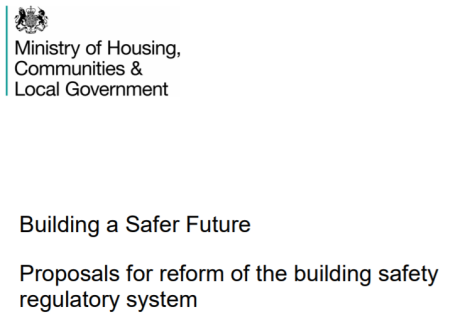Safety reporting proposals

|
| Alastair Soane, Director at Structural-Safety and ICE Fellow, explains why ICE members need to respond to a consultation that will create safer buildings. |
In June 2019, the Ministry of Housing, Communities and Local Government (MHCLG) published a consultation, seeking views on government proposals for a radically new building safety system which puts the safety of residents at its heart. This includes new safety reporting proposals for both fire and structural safety issues.
We're calling on ICE members and other industry professionals to lend their support and respond to the consultation, helping us to assure society that infrastructure professionals can be trusted.
The tragedy of the Grenfell Tower fire on 14 June 2017, which claimed the lives of 72 people, rocked confidence in the building safety system in the UK.
The Independent Review of Building Regulations and Fire Safety, led by Dame Judith Hackitt, produced a set of recommendations to provide a robust regulatory system for the future. One of the key recommendations is to build on the existing Confidential Reporting on Structural Safety (CROSS), a unique reporting scheme run by Structural Safety UK and sponsored by ICE, the Institution of Structural Engineers (IStructE) and the Health and Safety Executive (HSE). Its purpose is to share lessons learned from structural safety issues and help prevent future failures by providing insight into how safety issues occur and spurring the development of safety improvement measures.
Currently, the scheme collects voluntary reports on structural safety issues and freely shares the learning from these reports with industry on a no-blame basis. CROSS depends on professionals like you to submit those reports. Any lesson you have ever learned from a CROSS publication was only possible because someone like you decided to submit a report, allowing you to learn from their experience.
The government’s proposals would expand and strengthen the existing CROSS scheme to collect more voluntary reports on structural safety and establish a scheme for collecting reports on fire safety issues. There would also be a new mandatory system for key dutyholders to report occurrences of fire and structural safety issues to the building safety regulator.
Structural Safety fully supports the government’s safety reporting proposals and its view that the best systems of oversight and regulation ensure that the people operating within them learn from their experiences, without fear of blame or retribution.
We believe that the expanded and strengthened CROSS scheme, along with the new mandatory reporting scheme, will complement each other to develop a safety-focused culture in the sector and share intelligence to better understand safety risks and monitor safety trends. Effective safety reporting will be crucial to developing trust in the new building safety regulatory system and will lead to safer buildings.
This is why we're asking for your help. If the proposals receive adequate support, MHCLG may be able to provide early approval for the funding needed to expand CROSS.
Structural Safety has produced detailed guidance to help supporters to respond to three consultation questions in particular, with instructions on how to make a submission. This should take no longer than 15 minutes.
The deadline for responding is 31 July, but we'd encourage as many of you to respond as early as possible so that we can take these proposals forward without further delay. With your support, we can improve the industry’s safety record and ensure public confidence in our sector.
You can respond to the consultation here: https://www.gov.uk/government/consultations/building-a-safer-future-proposals-for-reform-of-the-building-safety-regulatory-system
This articles was originally published on 18 July 2019 on the ICE Civil Engineering Blog.
--The Institution of Civil Engineers
[edit] Related articles on Designing Buildings Wiki
- Analysis: Is Hackitt a turning point for the profession?
- Building a safer future: an implementation plan.
- Building a safer future: proposals for reform of the building safety regulatory system.
- Grenfell Tower articles.
- Grenfell Tower Fire.
- Hackitt review of the building regulations and fire safety, final report.
- ICE Grenfell Tower review.
Featured articles and news
Repairing historic stone and slate roofs
The need for a code of practice and technical advice note.
UKCW London to tackle sector’s most pressing issues
AI and skills development, ecology and the environment, policy and planning and more.
Managing building safety risks
Across an existing residential portfolio; a client's perspective.
ECA support for Gate Safe’s Safe School Gates Campaign.
Core construction skills explained
Preparing for a career in construction.
Retrofitting for resilience with the Leicester Resilience Hub
Community-serving facilities, enhanced as support and essential services for climate-related disruptions.
Some of the articles relating to water, here to browse. Any missing?
Recognisable Gothic characters, designed to dramatically spout water away from buildings.
A case study and a warning to would-be developers
Creating four dwellings... after half a century of doing this job, why, oh why, is it so difficult?
Reform of the fire engineering profession
Fire Engineers Advisory Panel: Authoritative Statement, reactions and next steps.
Restoration and renewal of the Palace of Westminster
A complex project of cultural significance from full decant to EMI, opportunities and a potential a way forward.
Apprenticeships and the responsibility we share
Perspectives from the CIOB President as National Apprentice Week comes to a close.
The first line of defence against rain, wind and snow.
Building Safety recap January, 2026
What we missed at the end of last year, and at the start of this.




















